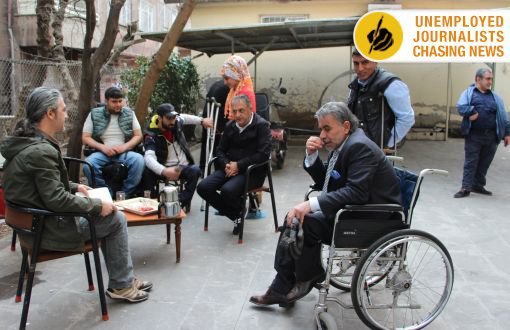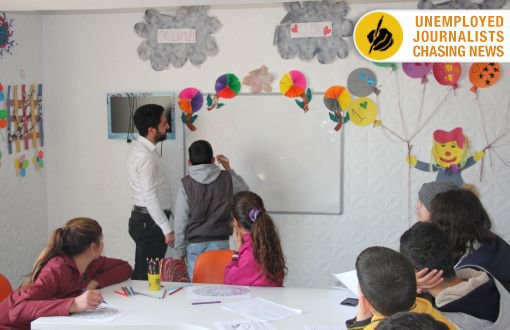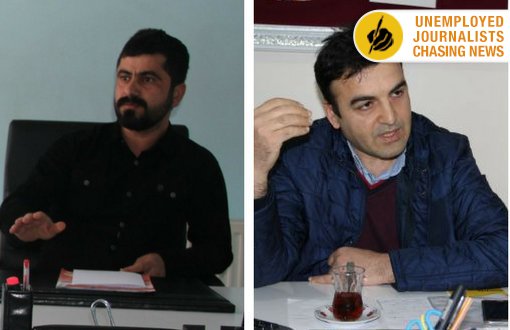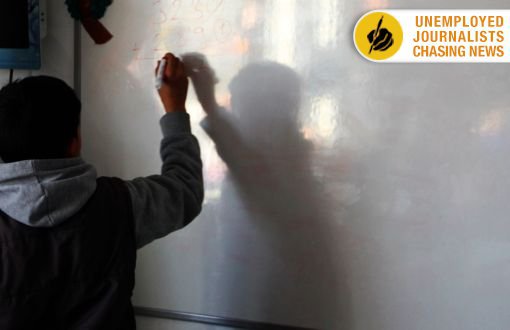Click to read the article in Turkish and Kurdish
It is the students and their families who are familiar with the problems experienced in the rehabilitation centers, not the ones who submit the reports to institutions in exchange for money or aid.
The system, which is formed by the institutions receiving fund appropriated by the state for individuals with disabilities, stands as an obstacle before the individuals with disability willing to receive education and their families.
We gave an ear to the stories of the individuals with disability receiving education and their families in Bingöl.
Student Kılıç tells her story
.jpg)
Gülseren Kılıç is 14 years old. She uses crutches due to weakness in her feet. She started to go to a rehabilitation center due to the weakness that began in her feet five years ago. Her treatment still continues.
Kılıç says that she saw some people who were registered in the center and they did not attend the courses.
Physical infrastructure is inadequate
Kılıç also complains about the inadequacy of the physical conditions in the rehabilitation centers:
“There is no elevator in some centers. Our friends who have difficulties are obliged to climb the stairs by themselves or with the help of others. There is no treadmill in the center. We are not provided adequate physiotherapy training. My condition could be improved in a shorter period of time, but my treatment takes longer than usual due to the lack of technical equipment. The course hours are also insufficient”.
Student A. Tells His/Her Story
The account of A., who is a student receiving education at a private rehabilitation center, reveals the negligence taking place. Stressing that the physical infrastructure of most of the rehabilitation centers in the area are inadequate, A. is aware that these centers approach them through a commercial mindset.
“They are very nice when it comes to asking for a certificate. They chase after us but everything changes after they get the certificate.
“For instance, a student with an orthopedic certificate who is displeased with the education can leave the school if he/she wants to. However, those who are mentally challenged cannot do that.
“The mentally challenged individuals can leave the school with family consent. The management of the schoolinteracts very well with the families of these students. The families are usually persuaded with money, but this is not the case for every family. Furthermore, the school management knows very well which families should be persuaded”.
“Students are persuaded with money”
Expressing that some of his/her friends staying at other schools cannot leave their schools despite making complaints about it, A. conveyed a conversation he/she had with a friend:
“I have a friend. He/she is not happy with his/her school. He/she complains about the teachers, principal, and education quality. I advised my friend to leave, but he/she cannot because private rehabiliatation centers pay the distance education enrollment fee. I said, ‘Can’t your father pay it?’ He/she said, ‘No, he cannot pay it’. My friend stays there because of money. He/she is somehow persuaded with money”.
Students who stay at home are made to look as though they attend courses
The student A. says there are students who don’t come to school, yet they are made to look as though they attend courses at private education and rehabilitation centers.
“Some families really seek a good education, and some others act in a completely opposite manner. Especially the families from villages are not very interested in education. They expect their children ‘to go to the schools so that some cash will come’. Certificates for these children are obtained and then they are registered in the schools.
“The student is made to look like he/she receives education while he/she is sitting at home.”.
Parents are frustrated
The parents who expect the educators to be sensitive are frustrated. The parents who live either in a city or rural area, including the ones that don’t know to read and write, state that it is impossible to follow the curriculum of their children.
Expressing that they don’t even know why they sign the documents brought by the officials of the schools in which their children receive education at the end of each month, the parents demand that this problem be solved by the Ministry of National Education.
“My father doesn’t know what he is signing ”
Ramazan Borlukan (38) earns his living working as a waiter.
His mentally challenged sibling received education at a private rehabilitation center.
Stating that his father is old and doesn’t know to read and write, Borlukan says, “I am working so I am not at home. I know that they take my sibling home from school but I don’t know which courses he/she takes. My father doesn’t know either. By the end of the month, they have us sign a document and that’s it. As the parent, my father signs it but I don’t think he knows what he signs for. Neither I nor my father know what sort of education is provided there”.
His concern about his sibling is not unfounded. He says his sibling has worsened since he started to go to the private rehabilitation center.
“My sibling is now more introvert. I believe there is something wrong with this education system”.
“This is an open hunt for people with disabilities”
.jpg)
Private rehabilitation and education centers scour the region and collect reports. These institutions specifically work in rural areas.
Mehmet Derman (32) says that these institutions visited him as well since he has a certificate of disability.
“It was between 2005-2006. I was in the village of Peyas in the central district. The people with the rehabilitation centers were going house to house. This was an open hunt for people with disabilities
“They were pledging to help and then they asked for certificate, ID photocopy and residence document. They came to me as well but I didn’t give them anything, however, I heard that a large number of people handed over their certificates without questioning in return of minor financial aid”. (RB-LA/NU/HK)
Tomorrow: Sur 1-2
***
UNEMPLOYED JOURNALISTS CHASING NEWS
1- Even Though They Speak Through Their New “Occupations,” They Are Journalists
2- Journalism is Banned under theState of Emergency
3- Germany: New Generation Diaspora/Kopuntu
4- Germany: Immigration of the Suffocated
5- The Organization that Made "The Arab Girl Looks from the Window"
6- How They Work/Cannot Work, Breaking Down the Stereotypes
7- They Marry White People to Avoid Discrimination
8- Private Rehabilitation Centers and Problems: The Example of Bingöl
9- Two Directors Discuss the “Educational Support for People with Disabilities” Practices
10- 'Solution is Inclusion System in Education for People with Disabilities'
11- Students and Parents from Bingöl Tell of Their Experiences
* The "Unemployed Journalists Chasing News" project is being realized with the financial support of Matra-Human Rights Program of Consulate General of the Kingdom of the Netherlands.(RB-LA/NU/HK)









